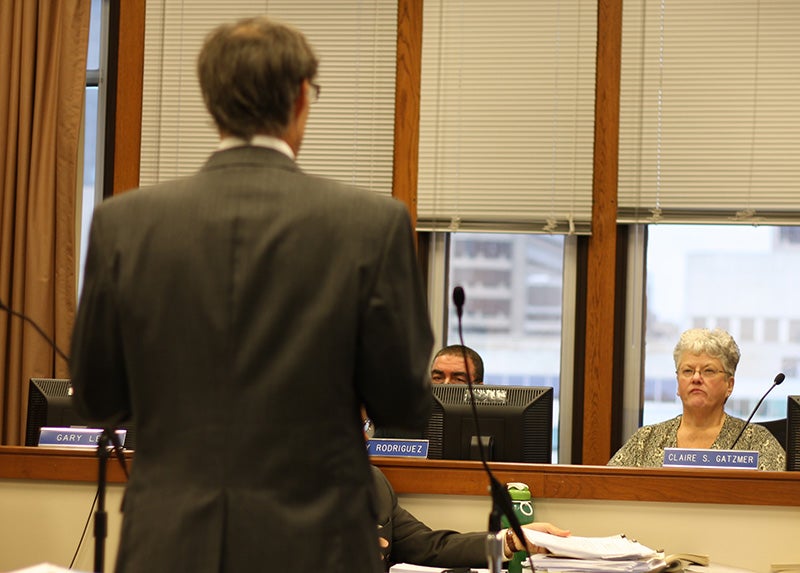Planning Commission supports new project at 40th and Pine, while appeal of existing property’s demolition continues
For Jonathan Weiss, the developer of a proposed five-story student-housing project at 40th and Pine streets, the day’s news was a mixed bag. The proposal would require the demolition of a historic Italianate mansion, disfigured by decades-old additions, which is owned by the University of Pennsylvania.
In May, the Historical Commission voted 7-2 with one abstention to allow the structure to be demolished, but the decision was appealed soon after by members of the Woodland Terrace Homeowners Association and attorney Paul Boni. Lawyers for the development team submitted a motion to dismiss the appeal, saying the appellants had no standing in the case. On Tuesday afternoon, after a 90-minute hearing, the Board of L&I Review ruled that the appellants have standing, and the appeal can proceed.
A few hours earlier, in another room in the same building, the Philadelphia City Planning Commission voted to support the developer’s request for zoning variances for the proposed project. Both the Board and the Commission were explicit in saying that their decisions were discrete: the Commission supports the zoning relief without comment on the appeal of the demolition, and the Board will hear the appeal without consideration of the proposed development.
At the Board of L&I Review hearing, Matthew McClure of Ballard Spahr argued that the appellants who were trying to stop the demolition of the building have no standing to appeal because they do not have a “substantial, direct, and immediate interest in the subject matter.” Two of the appellants own but do not reside in properties adjacent to the historic property at 40th and Pine. McClure has argued that some of the appellants oppose the demolition because the structure that would replace would draw potential tenants away from rental properties surrounding it.
Citing a handful of state court cases, McClure argued that in order to have standing, the appellants must have an interest in the property that is greater than that of the general public’s. He also said that courts have ruled that economic interest alone is not enough for an appellant to have standing.
Andrew Ross of the City’s Law Department also argued that proximity to a historic structure was necessary but not enough to establish the legal standing required to file an appeal against its demolition.
Referring to a different set of court cases, Paul Boni said the appellants’ legal standing is established merely by virtue of their ownership of property adjacent to the building in question. Boni said the nearby property owners’ interest in maintaining the historic structure was unrelated to any economic competition that might arise if the proposed development is allowed to proceed. He said he was “dismayed” that the motion to quash the appeal based on the appellants’ standing was filed at all.
Without explaining its reasoning, the Board unanimously voted to accept the appellants’ standing. The appeal will now proceed on the question of whether the Historical Commission was justified in allowing the demolition on the basis of financial hardship for the property owner. The next hearing is scheduled for October 16th, at 3 p.m.
After the hearing, Board members declined to comment on their decision because the case is ongoing.
“The Historical Commission fundamentally misapplied the law in allowing the demolition of this historic building,” said Paul Boni. “So it’s a good day for community groups and citizens of Philadelphia.”
Asked what he thought of the Board’s decision, Matthew McClure said, “We’ll accept it and move on.”
The Planning Commission, meanwhile, had unanimously elected to support zoning relief for the proposed project, a five-story, 66,000-square-foot, 122-unit apartment building to be marketed to graduate students. One of the variances sought by the developer is related to parking. The old zoning code, under which the applications were filed, requires that the building provide 122 parking spots, or one for every unit. The proposal includes zero parking spaces.
The developer’s team said the project is intended to be a Transit Oriented Development (TOD) project, and that the University of Pennsylvania has promised to provide parking spots to residents of the building at discounted rates in offsite garages. The Spruce Hill Community Association, in whose boundaries the site sits, also wrote a letter of support for the proposal to the Commission.
In testimony at the Commission meeting, SHCA President Ed Halligan called the site “an eyesore.”
Contact the reporter at jaredbrey@gmail.com and follow him on Twitter @jaredbrey
WHYY is your source for fact-based, in-depth journalism and information. As a nonprofit organization, we rely on financial support from readers like you. Please give today.





